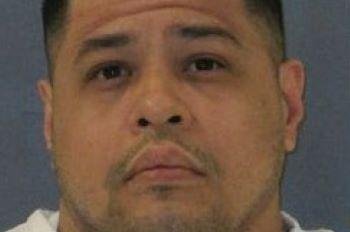Mark Soliz was executed for murdering Nancy Hatch Weatherly in 2010. Photo courtesy of Texas Department of Criminal Justice/The Texas Tribune
Sept. 10 (UPI) -- On Tuesday, Texas executed Mark Soliz for the 2010 home robbery and shooting death of a North Texas woman. The execution was the sixth in Texas this year and the third in the last month. Nine more are scheduled through December.
Soliz, 37, was convicted and sentenced to death in 2012 for the murder of Nancy Weatherly, 61, and the robbery of her Johnson County home, according to court records. Prosecutors said the murder was part of an eight-day crime spree during which Soliz and another man, Jose Ramos, robbed random people at gunpoint, and Soliz killed another man.
Soliz and his lawyers had long argued that his life should be spared because he had fetal alcohol spectrum disorder, which they claimed is the "functional equivalent" of an intellectual disability, a condition the U.S. Supreme Court has ruled disqualifies individuals from execution. Both state and federal courts rejected the claim during Soliz's relatively short seven years on death row.
Shortly after 6 p.m. Tuesday, Soliz was taken into the execution chamber in Huntsville and placed on a gurney. Soliz was apologetic in his final words, addressing Weatherly's family members.
"I wanted to apologize for the grief and the pain that I caused y'all," Soliz said. "I've been considering changing my life. It took me 27 years to do so. Man, I want to apologize, I don't know if me passing will bring y'all comfort for the pain and suffering I caused y'all. I am at peace."
He was then injected with a lethal dose of pentobarbital, the only drug used in Texas executions. He was pronounced dead at 6:32 p.m.
In June 2010, prosecutors said, Soliz and Ramos terrorized residents in the Fort Worth area for eight days before they were arrested on suspicion of one of several crimes, including multiple robberies, carjackings and shootings, another of which was fatal. When police interrogated Ramos about one stolen car, he began talking about another crime - in which he said the two men forced their way into Weatherly's house in Godley at gunpoint, and Soliz shot her in the back of the head as they robbed her home.
Soliz initially denied killing Weatherly, telling police he was outside by the car when he heard a gunshot and then saw Ramos exit the house. Later during the interrogation, he said he would confess "just to get this over with," according to a 2014 ruling from the Texas Court of Criminal Appeals. A friend of Soliz's later said he bragged to her about killing an "old lady." Ramos received life in prison without the possibility of parole for the murder.
At his trial and in his appeals to state and federal courts, Soliz repeatedly raised the claim that he should not have been executed because of his disorder. Several defense experts testified before the jury that he was diagnosed with partial fetal alcohol syndrome, which his lawyers claim caused mental impairments like lack of impulse control, serious adaptive learning deficits and hyper-suggestibility. But the testimony did not keep the jury from handing down a death sentence, and appellate courts did not interfere, partially because the claim was raised at trial and failed.
But Soliz argued his execution would go against his constitutional rights and recently noted changes in what is clinically considered an intellectual disability. Legal precedent prohibits states from executing people with intellectual disabilities, but Soliz sought to expand that, saying there are so many similarities between intellectual disability and fetal alcohol spectrum disorder that the conditions should be treated the same way in capital cases.
"There are striking parallels between the diagnostic criteria for intellectual disability and FASD," Soliz's lawyers wrote in a court filing last month. "Those afflicted with FASD should be categorically ineligible for the death penalty just as the intellectually disabled are, and Soliz's death sentence violates his Eighth Amendment protection against cruel and unusual punishment."
The Texas Attorney General's Office, which won the backing of the courts, countered that Soliz's request to change legal precedent is "overbroad."
"The Supreme Court has not held that individuals with FASD are exempt from capital punishment. Consequently, Soliz seeks to create - not rely on - a new rule of constitutional law," wrote Assistant Attorney General Jefferson Clendenin last week in response to Soliz's last appeals.
Clendenin also argued that Soliz was the leader in the crimes and was "sophisticated, calculated and dangerous."
Soliz's execution was the third carried out by Johnson County, which sits just south of Fort Worth, since the death penalty was reinstated nationwide in the 1970s. The last one was in 2004.
Texas' six executions so far this year make up more than a third of the 15 that have taken place in the country. Of the 17 executions still scheduled in the country through December - including three federal cases - nine are set to take place in the Texas death chamber in Huntsville, according to the Death Penalty Information Center. Last year, Texas executed 13 men.
Acacia Coronado contributed to this report.
This article originally appeared in The Texas Tribune. Read the original here. The Texas Tribune is a non-profit, non-partisan media organization that informs Texans -- and engages with them -- about public policy, politics, government and statewide issues.















